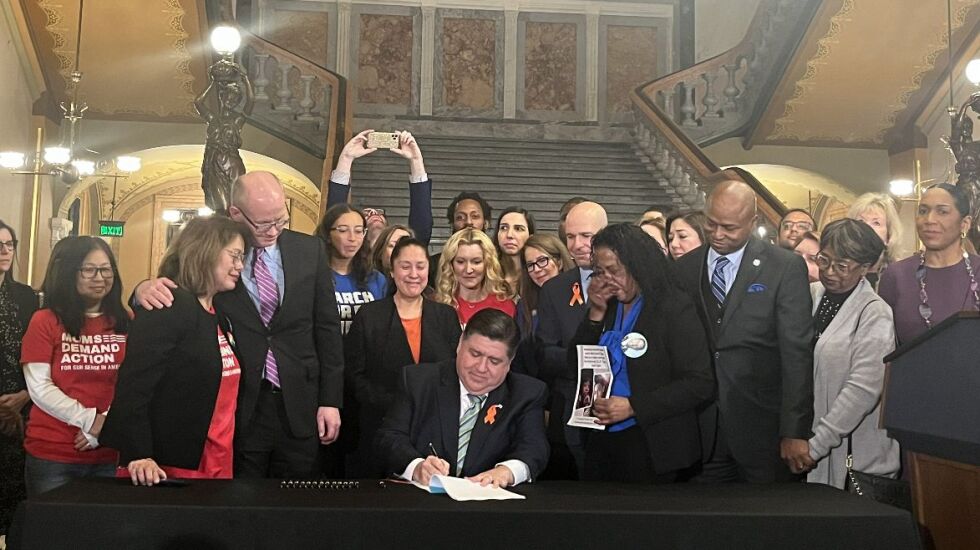
SPRINGFIELD — Assault weapons can no longer be sold in Illinois.
The state immediately banned the sale of the military-style weapons and high-capacity magazines Tuesday evening, with Gov. J.B. Pritzker’s signature on a bill the House had passed just hours earlier.
“Today, we made history, becoming the ninth state to institute an assault weapons ban —and one of the strongest assault weapons bans in the nation,” Pritzker said before signing the bill in a ceremony quickly put together at the state Capitol.
“I’m grateful that people cared enough to get this done now,” the governor said moments later, after holding up the signed bill. “This will save lives.”
His signature shortly before 8:30 p.m. immediately bans the sale of assault weapons in Illinois and caps the purchase of magazines at 10 rounds for long guns and 15 for handguns. It also makes rapid-fire devices, known as “switches,” illegal because they turn firearms into fully automatic weapons.
Those already owning the banned guns would be allowed to keep them but would have to register them with the Illinois State Police by Jan. 1.
In addition to thanking the legislators and activists who bucked the gun lobby to pass the bill, the governor paid tribute to some of the lives lost to assault weapons.
“It’s been a hard fought battle. But we have done this for Highland Park’s Kevin and Irina McCarthy, Jacquelyn Sundheim, Katherine Goldstein, Eduardo Uvaldo, Nicolas Toledo-Zaragoza and Stephen Straus. For Benito Juarez High School’s Brandon Perez and Nathan Billegas, just 15 and 14,” Pritzker said.
“We got this done for all the victims, children, parents, friends and loved ones who are no longer with us. And for those who have survived mass shootings, but were injured. Today we honor them, their trauma and their loss by preventing others from becoming victims.”
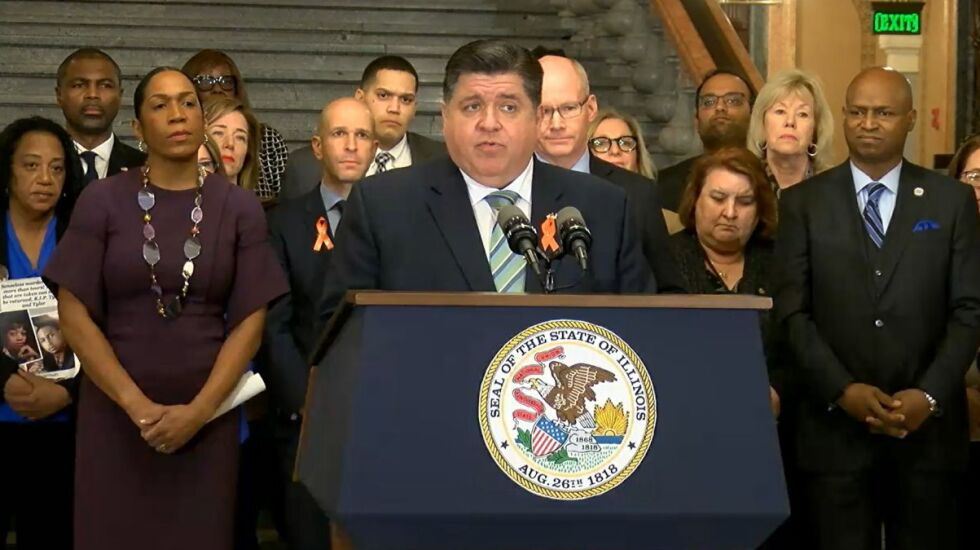
The passage comes six months after a gunman killed the seven and wounded more than 48 people at the Highland Park Fourth of July parade. Police say shooting suspect Robert Crimo III used a Smith & Wesson M&P15, an AR-15-style semiautomatic rifle whose initials, M&P, stand for “military and police.”
Earlier Tuesday, the Illinois House voted 68-41 to approve the measure, which included some changes made by the Illinois Senate.
“The people of the great state of Illinois have been waiting decades for legislation just like this,” said bill sponsor state Rep. Bob Morgan, D-Deerfield. “Let them wait no longer.”
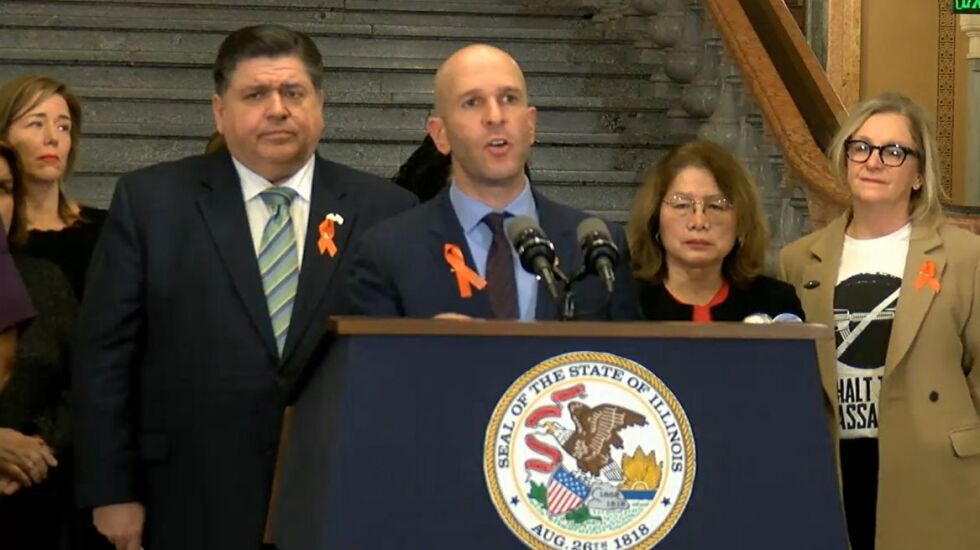
Highland Park Mayor Nancy Rotering applauded the bill’s passage and called it an “important step” but also urged the federal government to follow suit and enact a national ban.
“We need continued bold action to address mass shootings across our nation,” Rotering said in a statement, calling on Washington and other states to follow Illinois’ lead. “We urge them to continue their work towards protecting all Americans’ rights to live free from fear of gun violence.”
Final passage of the bill took some wrangling between the House and Senate after the House last week cleared the measure. But in the end, the two chambers — and Pritzker — came together to seal the deal.
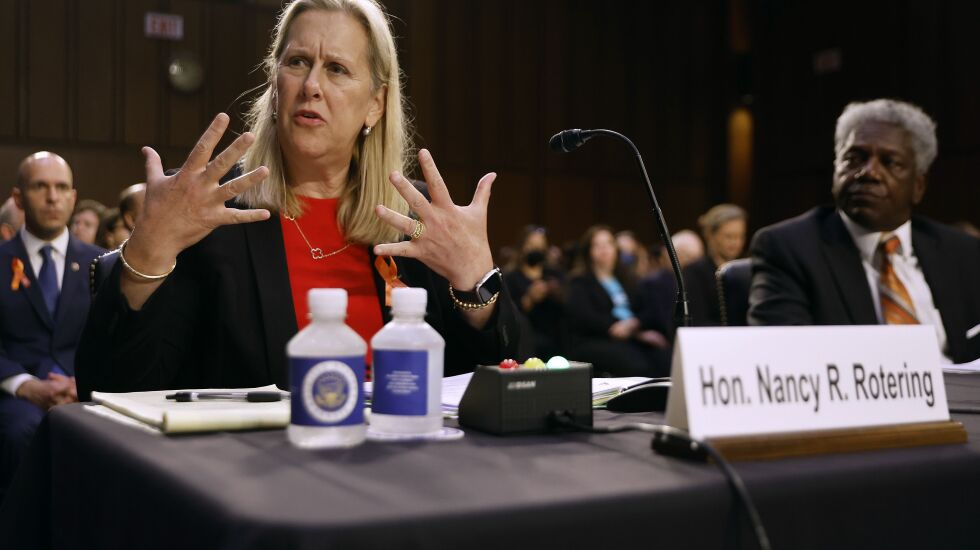
Republicans and gun-rights advocates have repeatedly argued the measure is unconstitutional and will penalize legal gun owners.
But Democrats said they’d roll the dice — considering any amount of time in which assault weapon sales are banned in the state to be a win. There were also initial concerns from criminal justice advocates about penalties for those caught with illegal guns and magazines. Republicans also criticized the types of weapons listed in the measure, arguing some were being used strictly for hunting.
During debate, state Rep. Tom Bennett, R-Gibson City, said the bill will greatly impact the 2.4 million “law-abiding gun owners” in the state. He also declared the initiative unconstitutional.
Changes made by the Senate to the measure included asking the Illinois State Police by administrative rule to provide further guidance to make sure hunters are not impeded. Private security contractors would also be offered exemptions regarding their firearms and magazines. And the use of large-capacity magazines would be allowed on private property and at firing ranges and sport shooting competitions 90 days after the measure becomes law.
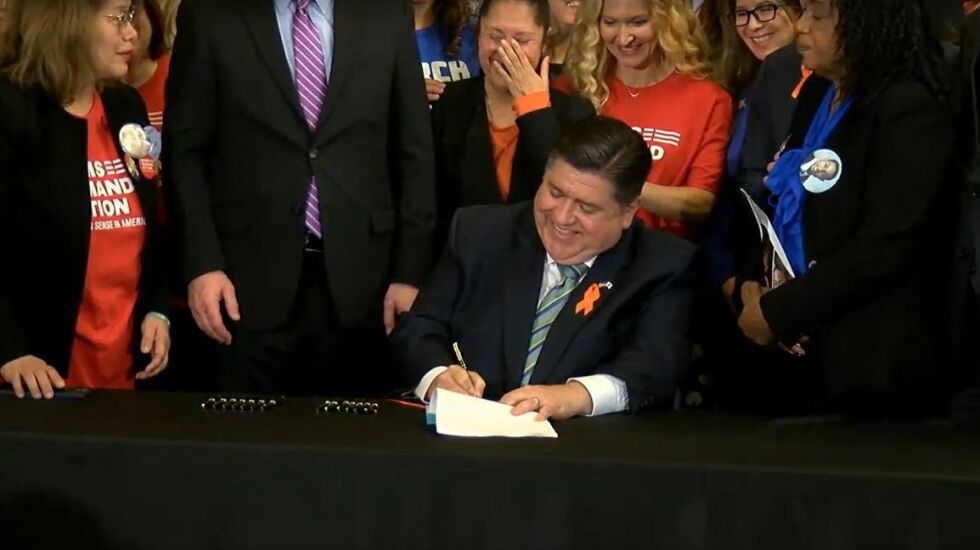
Language on high-capacity magazines was also changed, with 10 rounds allowed for long guns and 15 for handguns. The list of assault weapons was also updated. Other changes included allowing the Illinois State Police to add guns to the list of banned assault weapons.
House Democrats introduced the measure on Dec. 1 — and held three committee hearings in Chicago that featured more than 12 hours of emotional testimony from victims of gun violence, survivors and gun-rights advocates.
The initial bill featured language that would have raised the eligibility for a state firearm owner’s identification card to 21. But that was quickly removed from the measure last week during House negotiations.
Legislators sought to close what they saw as loopholes that led to the Highland Park shooting.
The Highland Park suspect was able to get a FOID card before he was 21 and buy multiple guns despite two incidents in 2019 in which he allegedly threatened to harm himself and his family.
Crimo was sponsored for a FOID card by his father because he was underage. Crimo then went on to purchase three firearms at age 20 and another the day he turned 21. He was 21 at the time of the massacre.
In January 2019, Illinois created a “red flag” law that allows relatives and police to petition courts to get a firearm restraining order to keep a dangerous person from having a gun.
The new legislation would also extend the duration of firearm restraining orders from six months to a year. It would also give state’s attorneys standing to assist in filing such an order.
Eight other states and the District of Columbia currently prohibit guns defined as assault weapons.
The Chicago Sun-Times and WBEZ reported in October that more people in Chicago possess large-capacity magazines and “switches” that convert handguns into illegal machine guns that can fire 20 shots in about a second.
Law enforcement officials said they believe the large-capacity magazines and switches are tied to an increase in mass shootings.







